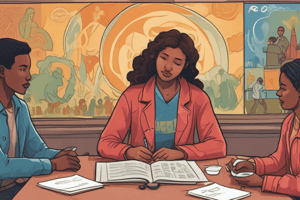Podcast
Questions and Answers
What is the primary focus of peace education?
What is the primary focus of peace education?
- Promoting social justice (correct)
- Emphasizing individual needs
- Resolving conflicts through violence
- Developing military strategies
Which of the following is NOT a common conflict resolution technique in peace education?
Which of the following is NOT a common conflict resolution technique in peace education?
- Collaborative problem-solving
- Negotiation
- Mediation
- Military intervention (correct)
What is the primary goal of conflict resolution in peace education?
What is the primary goal of conflict resolution in peace education?
- To prevent and resolve conflicts in a nonviolent, constructive manner (correct)
- To maintain the status quo
- To identify the root cause of the conflict
- To achieve a decisive victory
Which of the following conflict resolution techniques involves a third party assisting the conflicting parties in reaching a mutually agreeable solution?
Which of the following conflict resolution techniques involves a third party assisting the conflicting parties in reaching a mutually agreeable solution?
Which conflict resolution technique emphasizes parties engaging in a structured dialogue to reach a mutually beneficial agreement?
Which conflict resolution technique emphasizes parties engaging in a structured dialogue to reach a mutually beneficial agreement?
Which conflict resolution technique focuses on creating new ways of relating that are less violent and more peaceful?
Which conflict resolution technique focuses on creating new ways of relating that are less violent and more peaceful?
What is one of the primary goals of peace education?
What is one of the primary goals of peace education?
How does peace education help individuals become better problem solvers?
How does peace education help individuals become better problem solvers?
What aspect of peace education aims to address systemic issues that lead to conflicts?
What aspect of peace education aims to address systemic issues that lead to conflicts?
How does peace education approach conflict resolution?
How does peace education approach conflict resolution?
What is a key benefit of individuals learning to put themselves in someone else's shoes?
What is a key benefit of individuals learning to put themselves in someone else's shoes?
Why is teaching about power dynamics and privilege important in peace education?
Why is teaching about power dynamics and privilege important in peace education?
Flashcards
Peace Education
Peace Education
A teaching approach that helps people resolve community and societal conflicts.
Conflict Resolution
Conflict Resolution
The process of settling disagreements through conversation and understanding.
Mediation
Mediation
Using a neutral person to help conflicting groups reach a deal.
Collaborative Problem-Solving
Collaborative Problem-Solving
Signup and view all the flashcards
Negotiation
Negotiation
Signup and view all the flashcards
Assertiveness
Assertiveness
Signup and view all the flashcards
Conflict Transformation
Conflict Transformation
Signup and view all the flashcards
Understanding Different Perspectives
Understanding Different Perspectives
Signup and view all the flashcards
Empathy
Empathy
Signup and view all the flashcards
Social Justice
Social Justice
Signup and view all the flashcards
Power Dynamics
Power Dynamics
Signup and view all the flashcards
Privilege
Privilege
Signup and view all the flashcards
Study Notes
Peace Education: A Multi-Faceted Approach to Conflict Resolution
Peace education is an inclusive approach to teaching individuals how to resolve conflicts within communities and societies. It emphasizes understanding different perspectives, fostering empathy, and promoting social justice. Conflict resolution is one of its core components. This essay will delve into peace education's role in conflict resolution and discuss various strategies used by peace educators to promote peaceful coexistence.
Conflict Resolution: The Basis of Peace Education
Conflict resolution is the process of managing and resolving disagreements between individuals or groups through dialogue and understanding. It is a key aspect of peace education because it aims to prevent and resolve conflicts in a nonviolent, constructive manner. Conflict resolution techniques can be categorized into the following:
- Mediation: A third party assists the conflicting parties in reaching a mutually agreeable solution.
- Collaborative problem-solving: Parties work together to find a solution that satisfies their needs and interests.
- Negotiation: Parties engage in a structured dialogue to reach a mutually beneficial agreement.
- Assertiveness: Individuals express their needs and feelings without harming others.
- Conflict transformation: Parties create new ways of relating that are less violent and more peaceful.
Peace Education's Role in Conflict Resolution
Peace education provides students with the knowledge and skills necessary for conflict resolution. It fosters understanding of different perspectives, encourages empathy, and promotes social justice. By teaching these values, peace educators can help individuals become better communicators, problem solvers, and decision-makers. This, in turn, contributes to a society where conflicts are addressed through dialogue and mutual respect rather than violence.
Understanding Different Perspectives
One of the primary goals of peace education is to encourage open-mindedness toward diverse viewpoints. When people understand each other's perspectives, they are more likely to find common ground and resolve conflicts peacefully. Peace educators use various methods, such as group discussions or role-plays, to foster empathy and understanding among learners.
Promoting Empathy
Empathy is another crucial aspect of peace education. By learning to put themselves in someone else's shoes, individuals develop a greater sense of compassion and fairness that can aid in conflict resolution. Peace educators teach empathy through storytelling, art projects, and other creative activities designed to promote emotional intelligence and interpersonal competence.
Advocating Social Justice
Social justice is integral to peace education because it helps address systemic issues that contribute to conflicts. Peace educators teach about power dynamics, privilege, and inequality, empowering individuals to advocate for change within their communities. Through this approach, peace education aims to create a more just and equitable world, reducing the likelihood of conflicts based on socioeconomic disparities or other forms of discrimination.
Conclusion
In conclusion, peace education plays a vital role in promoting conflict resolution skills within individuals and communities. By teaching empathy, understanding different perspectives, and advocating social justice, peace educators equip learners with essential tools for resolving disagreements constructively. Ultimately, these efforts contribute to more peaceful societies where conflicts are managed through dialogue rather than violence.
Studying That Suits You
Use AI to generate personalized quizzes and flashcards to suit your learning preferences.





